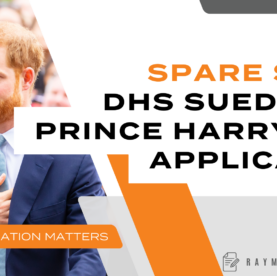President Trump Bans Certain Immigrant Green Cards for 60 Days

As promised, last night, President Donald Trump signed an Executive Order that limits the ability of certain future immigrant visa applicants to enter the United States as lawful permanent residents, as a result of the COVID-19 pandemic.
The President’s Executive Order, the “Proclamation Suspending Entry of Immigrants Who Present Risk to the U.S. Labor Market During the Economic Recovery Following the COVID-19 Outbreak,” noted that the COVID-19 pandemic:
has significantly disrupted the livelihoods of Americans. . . [with] mitigation strategies, including social distancing. . . to reduce the spread of. . . COVID-19. This needed behavioral shift has taken a toll on the United States economy, with national unemployment claims reaching historic levels. In the days between the national emergency declaration and April 11, 2020, more than 22 million Americans have filed for unemployment.
This, the Executive Order states, has led to the President’s determination “that, without intervention, the United States faces a potentially protracted economic recovery with persistently high unemployment if labor supply outpaces labor demand.” Given that “lawful permanent residents, once admitted, are granted ‘open-market’ employment authorization documents, allowing them immediate eligibility to compete for almost any job, in any sector of the economy. . . [t]here is no way to protect already disadvantaged and unemployed Americans from the threat of competition for scarce jobs from new lawful permanent residents by directing those new residents to particular economic sectors with a demonstrated need not met by the existing labor supply.” Further, the significant and nearly overwhelming impact of the COVID-19 pandemic on the United States health care system, the Executive Order proclaims, will put more “strain on the finite limits of [the U.S.] healthcare system at a time when [the] need [is] to prioritize Americans and the existing immigrant population.”
The Executive Order holds that the current immigration system lacks any adequate “protections. . .for [America’s] recovery from the COVID-19 outbreak,” and, as a result, the President declared that “the entry, during the next 60 days, of certain aliens as immigrants would be detrimental to the interests of the United States,” thereby limiting individuals outside the United States that seek to enter the United States as lawful permanent residents (immigrants or “green card” holders), with certain exceptions.
When the Suspension on Immigration Is in Effect
The Executive Order takes effect at 11:59 PM EDT, Thursday, April 23, 2020, and will remain in place for 60 days, or June 23, 2020, at which time, President Trump will review the Executive Order to determine if an extension is warranted.
Who the Executive Order Affects
The Executive Order is only applicable to the following individuals:
- Those who were outside the United States on 11:59 PM EDT on April 23, 2020, and were not already lawful permanent residents
- Those who do not have an immigrant visa (permanent resident stamp for first-time entry as a permanent resident into the United States) that is valid and unexpired on 11:59 PM EDT on April 23, 2020
- Those who do not have an official document other than a visa (i.e., a transportation letter, an appropriate boarding foil, or an advance parole document) that is valid and unexpired on 11:59 PM EDT on April 23, 2020, or issued on any date thereafter that permits him or her to travel to the United States and seek entry or admission
Who the Executive Order Exempts
The Executive Order provides many exemptions to the 60-day suspension of issuance of lawful permanent resident status abroad. These exemptions include the following individuals:
- The obvious: United States citizens
- Current lawful permanent residents (green card holders)
- Current conditional lawful permanent residents
- Individuals in the United States applying for lawful permanent residents
- Spouses of U.S. citizens
- Individuals who are under the age of 21 and are children of U.S. citizens or prospective adoptees seeking to enter the United States pursuant to the IR-4 or IH-4 visa classifications
- Individuals seeking to enter the United States on an immigrant visa as a physician, nurse, or other health care professional; to perform medical research or other research intended to combat the spread of COVID-19; or to perform work essential to combating, recovering from, or otherwise alleviating the effects of the COVID-19 outbreak, as well as their accompanying spouses and children under the age of 21
- Individuals applying for a visa to enter the United States pursuant to the EB-5 Immigrant Investor Program
- Any individual whose entry would further important U.S. law enforcement objectives, as determined by the Secretary of State, the Secretary of Homeland Security, or their respective designees, based on a recommendation of the Attorney General or his designee;
- Members of the United States Armed Forces and their spouses and children
- Individuals seeking to enter the United States pursuant to a Special Immigrant Visa in the SI or SQ classification, subject to such conditions as the Secretary of State may impose, and any spouse and children of any such individual
- Asylees, Refugees, and others granted protection by the United States Government pursuant to Withholding of Removal or the United Nations Convention Against Torture and Other Cruel, Inhuman or Degrading Treatment or Punishment
- Any individual whose entry would be in the national interest as determined by the Secretary of State, the Secretary of Homeland Security, or their respective designees
- Non-immigrants subject to other limitations on entry related to the COVID-19 pandemic for those entering the United States from certain COVID-19 hotspots, such as China, the United Kingdom, European Union member countries, Mexico, and Canada
To learn more about this blog post or if you have any other immigration concerns, please feel free to contact me at rglahoud@norris-law.com or (484) 544-0022. For other topics related to COVID-19, visit our Coronavirus Thought Leadership Connection.
The information contained in this post may not reflect the most current developments, as the subject matter is extremely fluid and constantly changing. Please continue to monitor this site for ongoing developments. Readers are also cautioned against taking any action based on information contained herein without first seeking advice from professional legal counsel.





